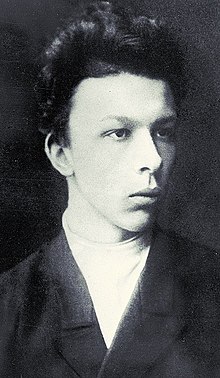Aleksandr Ilyich Ulyanov (Russian: Алекса́ндр Ильи́ч Улья́нов; 12 April [O.S. 31 March] 1866 – 20 May [O.S. 8 May] 1887)[1] was a Russian revolutionary and political activist. He was the elder brother of Vladimir Lenin, the founder of the Soviet Union.
Aleksandr Ulyanov | |
|---|---|
 Ulyanov in 1887 | |
| Born | 12 April [O.S. 31 March] 1866 |
| Died | 20 May [O.S. 8 May] 1887 (aged 21) |
| Cause of death | Execution by hanging |
| Occupation(s) | Revolutionary socialist, political activist, student |
| Parents | |
| Relatives |
|

Early life
editUlyanov was born in Nizhny Novgorod, the second child and eldest son of schoolteachers Ilya Nikolayevich Ulyanov and Maria Alexandrovna Ulyanova. He was often referred to as Sasha, a common diminutive form of the name Aleksandr.[2] He graduated with honors from the Classical Gymnasium of Simbirsk in 1883 and later attended Saint Petersburg Imperial University, where he majored in Natural Sciences and earned a degree in zoology. While at university, he participated in illegal meetings and demonstrations, often handing out pamphlets and making speeches to students and workers.
Revolutionary
editIn 1886 he became a member of the "terrorist faction", which was part of the Narodnaya Volya (People's Will) party. He was one of the authors of the party's program. Acknowledging the working class as the "nucleus of the Socialist Party", the program affirmed the revolutionary's initiative of fighting autocracy through terrorism.
Attempted assassination of Alexander III
editUlyanov and his comrades conspired to assassinate Alexander III of Russia. On 1 March 1887 (Julian calendar), the day of the sixth anniversary of Alexander II's murder, three party members were arrested in the Nevsky Prospekt carrying handmade bombs filled with dynamite and lead pellets poisoned with strychnine. Police suspected that when Alexander III visited church on the anniversary of his father's assassination, the plotters would throw bombs into the Emperor's carriage. The attempt is known as "The Second First of March".[3]
Ulyanov, who served as both the main ideologist of the group as well as the bomb-maker, was later arrested. In court Ulyanov gave a political speech. The conspirators were initially sentenced to death; all but five were then pardoned by Alexander III. Ulyanov was not among those pardoned. On 8 May, he and his four comrades – Pakhomy Andreyushkin, Vasily Generalov, Vasili Osipanov, and Petr Shevyrev – were hanged at Shlisselburg.[4]
Aleksandr's execution drove his younger brother Vladimir Ilyich Ulyanov (Vladimir Lenin) to pursue the Russian revolutionary struggle ever more fervently. Vladimir was already active in politics prior to his older brother's arrest and expressed qualified admiration for his older brother. Later in life he recalled thinking, "No, my brother won't make a revolutionary, I thought at the time. A revolutionary can't give so much time to the study of worms." Lenin also remembered how his family were shunned by liberal circles in Simbirsk following his brother's arrest.[5]
Legacy
editA minor planet, 2112 Ulyanov, was discovered in 1972 by Soviet astronomer Tamara Mikhailovna Smirnova and named after him.[6][7]
References
edit- ^ Clark, Ronald (1988). Lenin. New York U.a. p. 15.
- ^ "Lenin's Brother: An Interview with Philip Pomper".
- ^ Mark Aleksandrovich Aldanov (1922). Lenin. New York: E. P. Dutton. p. 4.
- ^ Philip Pomper (2010). Lenin's Brother: The Origins of the October Revolution. New York: W. W. Norton & Company. ISBN 978-0-393-07079-8.
- ^ Nadezhda Krupskaya (1933). "St. Petersburg, 1893–1898". Reminiscences of Lenin. Vol. 1. Translated by Bernard Isaacs. Retrieved 2018-12-20.
- ^ Schmadel, Lutz D. (2003). Dictionary of Minor Planet Names (5th ed.). New York: Springer Verlag. p. 171. ISBN 3-540-00238-3.
- ^ "Lenin". Spartacus Educational. Retrieved 2018-08-01.